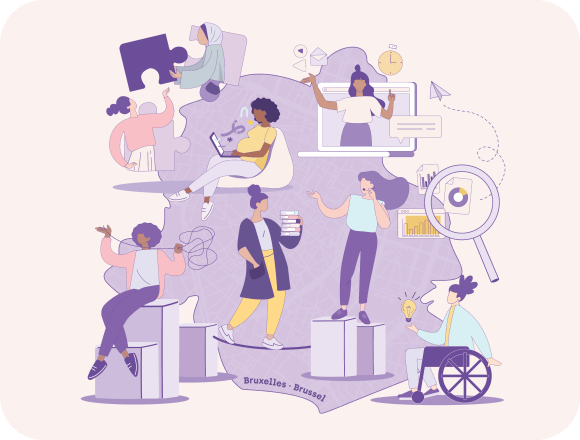Female entrepreneurship in Brussels
Female entrepreneurship in Brussels is represented through the 30,874 self-employed women who experience this adventure on a daily basis. Who are they? How do they manage their businesses? What are their needs?
This barometer aims to bring together stakeholders in the female entrepreneurship ecosystem around a collective reflection and vision.
Find out what’s going on behind the scenes and the challenges faced by female entrepreneurs in Brussels in under ten minutes!

Understanding the context of female entrepreneurship
What’s the current situation for self-employed women in Brussels?
Answer the five questions below with what you think is the “right answer”. Don’t worry, they won’t be saved and only you’ll know your answers.
Quiz
Discover the identity card of the female Brussels entrepreneur
Who is the woman behind the self-employed status in Brussels? We invite you to find out more about her through this interactive infographic.
Click on the spots (+) for more information on a category.
Identity card
Understanding the challenges of female entrepreneurship in Brussels
What do you need to know to support Brussels’ self-employed women?
Explore the six key findings on female entrepreneurship below.
Finding 1 · Self-employed women in Brussels are under-represented among Belgian women of working age

Self-employed women in Brussels are under-represented in the population of Belgian women of working age. As the diagram shows, 11% of Belgian women of working age are Brussels residents, while 9% of full-time self-employed Belgian women are Brussels residents.
More specifically, in Brussels, one in two women work and 11% of them are full-time self-employed, compared with 25% of working men.
Finding 2 · In the pre-creation phase, women are less well-equipped than men in terms of entrepreneurial knowledge and skills
When launching their project, self-employed women claim to have less entrepreneurial knowledge and skills.
They report difficulties in creating a business plan and setting up product production.
They claim to be less familiar with support measures, federal and/or regional grants and subsidies and financing options.
Finding 3 · Self-employed women have more difficulty in finding financing than self-employed men
The two most common sources of advice used by self-employed people are:
Their accountant
Their friends and family
Self-employed women consider themselves less well advised in their search for financing. Fewer of them use a business start-up coach and they have less contact with finance experts.
Finding 4 · Self-employed women claim that the main reasons they are turned down for financing are the lack of financial guarantees
One of the best-known and/or most frequently used sources of finance is the same for all self-employed people: bank loans or credit.
However, many self-employed women are turned down for financing. The three main reasons are:
The guarantees are deemed insufficient
The fact that they did not meet the conditions for granting finance
Their repayment capacity was deemed insufficient
They then turn mainly to the other two sources of financing they are familiar with:
Personal contribution
Love money (financing from family or friends)
This shows that the existence of economic capital can facilitate the launch and development of their entrepreneurial activity. However, more than one in two self-employed women have an income of less than 20,000 euros a year. They then find themselves facing an increased risk of financial insecurity, which may be one of the reasons that they are refused funding.
In addition, self-employed women make less use of other financing opportunities such as:
Investment funds
Microcredit
Public subsidies
Finding 5 · The majority of self-employed women work in the liberal or intellectual professions or in the retail sector.
The breakdown of self-employed women by sector has not changed significantly since 2018.

Over half of self-employed women in Brussels work in a liberal or intellectual profession. This sector’s share of new business start-ups is on the rise (+10.5 points between 2018 and 2021), to the detriment of the retail sector, which remains the second-largest business sector for self-employed women. This sector accounted for just 21.1% of new business in 2021, compared with 28% in 2018.
Finding 6 · Support for female entrepreneurship is considered useful by self-employed people in Brussels
Two female entrepreneurship initiatives are considered useful by self-employed people:
Business networks and circles dedicated to women
Business cooperatives
The self-employed women surveyed have a preference for women’s business networks, particularly in terms of sisterhood offering greater solidarity between members.
To go further
Full report
Explore the full report and discover in detail the state of women’s entrepreneurship in 2023.
Spread the word on social networks
Share the key figures of the 2023 barometer by downloading the social networking pack.
